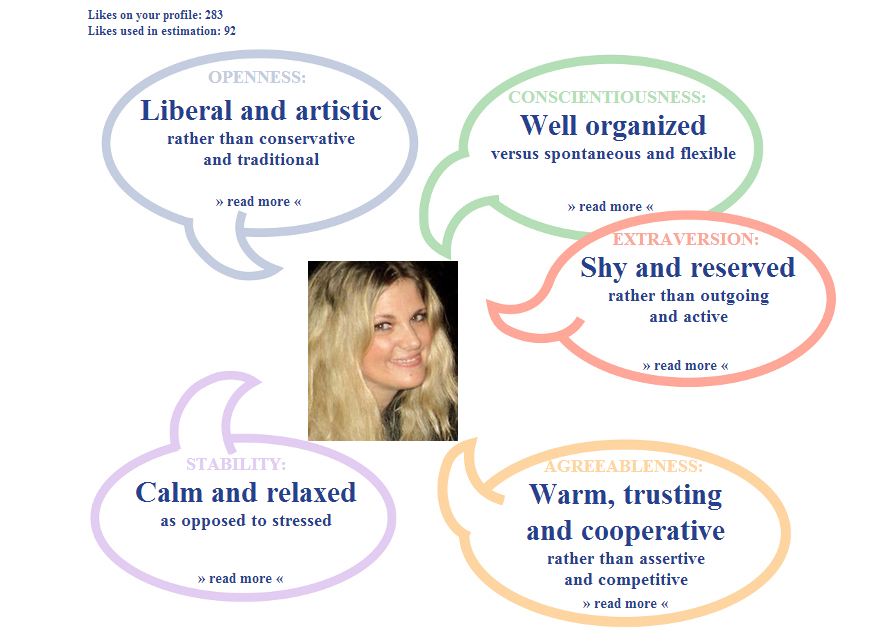
In a PRISM-filled world, companies are starting to rightfully question how much private and personal information they share via social media. Businesses these days walk a very fine line in public communications; it’s critical to be personal and warm, and yet not too overtly so as to not alienate others or betray the brand. Digital leaders are also becoming increasingly more aware that nothing is actually private or sacred in the online space, and all these seemingly conflicting priorities can cause mass confusion for online marketers.
Facebook, by far, showcases more intimate details about companies and the people that run them. All those “Likes,” comments, images, and status updates are logged for eternity, and many are starting to quantify what all the data points actually indicate.
Want to see what your Facebook history reveals about you? It only takes a few seconds. Visit the new genius You Are What You Like website, login with your Facebook credentials, and it will instantly evaluate your “Likes,” and make personality assessments. Categories include Openness, Conscientiousness, Extraversion, Agreeableness, and Stability (yes, Facebook knows if you’re stable).
The personal reveal goes a lot deeper than stability, however — a new study from The University of Cambridge shows that the private details we share during unconscious social moments can literally leave an indelible mark. Their in-depth research shows that “intimate personal attributes can be predicted with high levels of accuracy from ‘traces’ left by seemingly innocuous digital behaviour, in this case Facebook Likes.” This means the more you click “Like,” the more your privacy may be at risk; and this goes equally for individuals and businesses.
By analyzing participants’ social signals, the researchers were able to accurately determine extremely intimate details like sex, sexual orientation, political affiliation, and many, many more reveals. For some, this sounds obvious: If someone clicks “Like” at the “Christian Singles Organization” page, it’s easy to ascertain a few key traits. The study, however, shows that users and businesses need not be so obvious:
Few users clicked Likes explicitly revealing these attributes. For example, less that 5% of gay users clicked obvious Likes such as Gay Marriage. Accurate predictions relied on ‘inference’ — aggregating huge amounts of less informative but more popular Likes such as music and TV shows to produce incisive personal profiles. Even seemingly opaque personal details such as whether users’ parents separated before the user reached the age of 21 were accurate to 60%, enough to make the information ‘worthwhile for advertisers’, suggest the researchers.
How does this relate to your business image? If your employees are open about their connection to you, and in turn create a public persona that is perhaps antithesis to the things you want your brand to represent, that can create significant conflict. And it’s easier than ever to assess what a person stands for by scrolling through their feed.
More poignantly, your business page could also reveal far more than you intend. If you link your business page publicly to a personal profile, know that it’s then possible for anyone to make the connection, and start making assumptions about you and your business. If you are a business without a company profile, and you’re mixing the two feeds together, it creates a lack of professionalism and seriousness, and anything you say or do reflects on your company too. Small business owners wisely like to put a personal face to their operations, but at least a layer of separation between business and pleasure is essential to creating a strong, reliable brand.
Additionally, throughout your social and content strategies, don’t be afraid to create a warm persona to match your brand, but there’s no need to share any personal likes or dislikes beyond what your campaigns reveal. “Liking” a client’s page may sound like a great way to support their efforts; if they are involved in anything controversial or outside the realm of your brand’s identity you could create confusion at best or complete alienation at worst.
Every word on your business profile is essential, and every image, “Like,” and status update says volumes about the persona you are creating. Facebook is therefore a direct reflection of your business IQ, and more tools to assess such things are certainly on the horizon.
You may even want to consider a radical notion and either abandon Facebook or use it only for major campaigns. In this year’s Social Media Marketing Industry Report, only 37% of marketers reported that Facebook had been even moderately successful in elevating their marketing, yet everyone still overwhelming names it as the social platform of choice.
The point is, if you choose to use social media, do so with complete awareness, not the typical “everyone else is doing it, so should I” mantra. Never forget that everything you post and do is held indefinitely, and every social signal you send adds to the story of who and what your business is. Be thoughtful and strategic, study results obsessively, and tell the story you envision for your brand — and then sit back and enjoy the fruits of your labors.
Image by YouAreWhatYouLike.com.